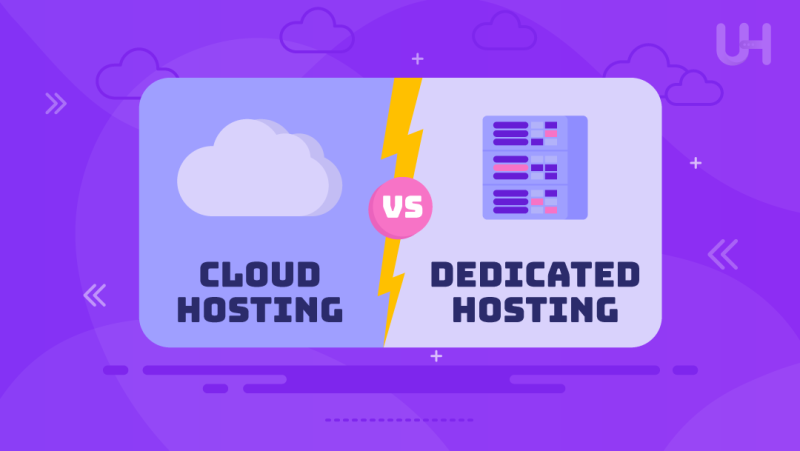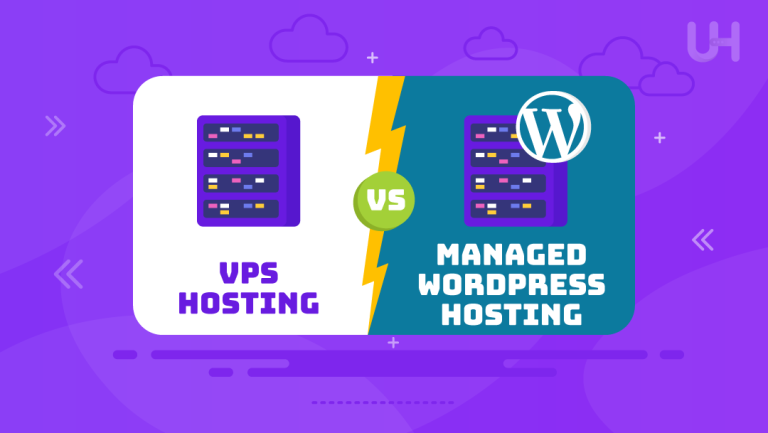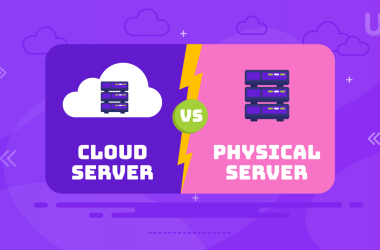In the fast-growing digital marketplace, having a website gets any business running successfully. Astoundingly, 27% do not have an online existence, while 73% have already set up their websites. Therefore, selecting the appropriate web hosting service will be the first step in making your journey relevant to the digital world; this is so crucial because it directly affects your website’s performance, security, and scalability. Options range from cloud hosting vs dedicated hosting for serving different needs and budgets.
In this article, we will discuss cloud hosting and dedicated hosting. We will explore the differences between cloud hosting and dedicated hosting to help you make an informed decision that best aligns with your business goals.
What is Cloud Hosting?
The concept of cloud hosting is that running websites and applications is not dependent on one server; instead, it utilizes several virtual servers, often called cloud servers. This ensures a highly flexible environment and increased reliability since computing resources and storage are scattered across various cloud servers. Hence, each acts as a virtual server, which adds to the robustness and scalability of the hosting environment.
Pros of Cloud Hosting
Cloud hosting offers several key features and benefits that make it an appealing choice for many businesses. Let’s explore these advantages:
Scalability
Unlike dedicated servers, which have fixed resources, cloud hosting allows users to adjust virtual resources based on their current needs. This flexibility makes it easier to manage unexpected traffic spikes without the need for permanent investment in higher capacity.
Cost Efficiency
With cloud hosting, you pay only for what you use. Since resources are spread across multiple servers for load balancing, you can scale them up or down as needed. This helps you avoid the costs of unused capacity typically found in dedicated servers.
Reliability
The cloud environment is set up across multiple servers, which enhances reliability. If one server fails, others can take over, ensuring continuous service availability. This is a significant advantage over dedicated servers, where server failover can result in downtime.
Accessibility
Cloud hosting providers offer zero downtime, making this level of accessibility critical for businesses with remote teams or those that require access to their systems from various locations.
Advanced Security
While security is often a concern with cloud environments, many hosting providers implement rigorous security measures to protect their systems from DDoS attacks. These measures can include managed backups, data encryption, and various safety features that often surpass those available with dedicated servers.
Maintenance and Upgrades
In a cloud computing environment, the hosting provider is responsible for managing maintenance and upgrades. This contrasts with dedicated servers, where the user must handle all maintenance and updates.
Cons of Cloud Hosting
Cloud hosting comes with a few drawbacks along with various benefits of cloud hosting which include:
- Dependency on Internet Connectivity: Accessing cloud hosting services necessitates a reliable internet connection, as any instability can lead to service interruptions.
- Shared Infrastructure: Cloud hosting often relies on shared resources among multiple users. While this model is generally secure, it can sometimes affect performance, particularly during periods of high demand.
Cloud hosting is a great choice for businesses seeking scalability and flexibility. Consider DDoS-protected web hosting for dependable and secure cloud solutions.
Who Benefits from Cloud Hosting the Most?
Here is a list of businesses that can benefit from cloud hosting:
- E-commerce Sites: E-commerce platforms can effectively handle increased traffic during peak sales periods without disrupting services.
- Growing Startups: Startups with plans for significant growth can quickly scale their resources to accommodate a rising user base.
- Seasonal Businesses: These companies can adjust their hosting capacity to align with seasonal spikes and dips in traffic, ensuring cost efficiency.
- Websites Requiring High Uptime: Websites that need consistent uptime benefit from the robust infrastructure and continuous availability offered by cloud servers.
- Agencies Managing Multiple Client Portfolios: Cloud hosting provides agencies with the flexibility to quickly adjust resources to meet the varying needs and traffic demands of different clients.
What is Dedicated Hosting?

Dedicated hosting refers to a hosting solution in which an entire physical server is allocated to a single user or organization. This arrangement means that the user has exclusive access to all the server’s resources, including CPU, RAM and storage allowing for extensive customization and configuration to meet specific needs.
Dedicated hosting offers several advantages, including optimal performance due to exclusive server resources, leading to faster load times and increased reliability. It enhances security by reducing risks associated with shared hosting environments and allows organizations to implement their own security measures.
Pros of Dedicated Hosting
- Maximum Performance: Dedicated servers provide high-speed performance without the risk of sharing resources with other users.
- Enhanced Security: Operating in a dedicated environment enhances the security of sensitive data, making these servers ideal for e-commerce and financial applications. Consider managed dedicated server options for additional security.
- Customization: Users have complete control over the server’s configurations, software installations, and hardware upgrades.
- Dedicated IP Address: A dedicated IP address helps prevent blacklisting issues that are often associated with shared IPs, which can improve both SEO and email deliverability.
- Reliability: Dedicated servers are unaffected by other users’ activities, ensuring consistent performance at all times.
Ready to Purchase Dedicated Hosting?
Explore Ultahost’s Dedicated Hosting and find the perfect solution to meet your business’s growing demands. Boost your performance and secure your data with a dedicated server today.
Cons of Dedicated Hosting
- Higher Costs: Dedicated servers are more expensive than cloud hosting due to exclusive resource allocation.
- Limited Scalability: Unlike cloud hosting, scaling dedicated resources requires hardware upgrades.
Dedicated hosting is ideal for businesses that need full control, high security, and superior performance. Consider SSD Dedicated Servers for fast hosting solutions.
Cloud Hosting vs Dedicated Hosting: A Comparison
| Feature | Cloud Hosting | Dedicated Hosting |
| Scalability | Highly scalable with resource allocation as needed | Limited scalability requiring hardware upgrades |
| Cost | Pay-as-you-go pricing | Fixed monthly or yearly costs |
| Performance | Dependent on shared resources | Superior performance with exclusive resources |
| Security | Secure but involves shared infrastructure | High-level security with isolated servers |
| Control | Limited control over the server environment | Full control over hardware and software configurations |
| Downtime | Minimal due to distributed servers | Rare, but dependent on the physical server’s condition |
Choosing between dedicated hosting and cloud hosting depends on your website’s needs and budget.
Dedicated Hosting vs Cloud Hosting: Scalability
Cloud hosting excels in scalability, allowing users to adjust virtual resources according to their immediate needs and demands. This flexibility makes it the ideal choice for businesses with fluctuating workloads.
In contrast, dedicated hosting lacks this level of adaptability. Scaling typically requires physical hardware upgrades or the addition of servers, which can be costly and time-consuming.
Cost Comparison Between Cloud Hosting and Dedicated Hosting
Dedicated hosting tends to be more expensive due to the exclusive use of hardware and the physical resources required. While these costs are steady and predictable, they can become quite significant, especially when upgrading or expanding your hardware.
On the other hand, cloud hosting is generally more cost-effective, particularly for businesses that do not consistently need high levels of server resources.
Cloud Hosting vs Dedicated Hosting: Performance
Dedicated hosting provides exceptional performance because it utilizes dedicated physical server resources, making it the best option for high-traffic websites.
In contrast, cloud hosting’s performance can fluctuate since resources are distributed across multiple servers in a virtual environment. This distribution is due to the way resources are allocated and shared among all users in the cloud. While cloud hosting can quickly scale resources to manage traffic spikes, it may not consistently offer the same raw power as a dedicated server.
Security Concerns Between Cloud Hosting vs Dedicated Hosting
Dedicated servers offer enhanced security measures, allowing you complete control over your security settings. This reduces your exposure to vulnerabilities associated with other users. Additionally, dedicated servers enable you to implement tailored security protocols, making them ideal for businesses that handle sensitive data.
On the other hand, cloud hosting, while generally secure, involves storing and processing data across multiple servers and locations. This can complicate the enforcement of security measures. However, many reputable hosting providers implement robust security protocols across their cloud environments to mitigate these risks.
Cloud Hosting vs Dedicated Hosting: Control and Customization
Dedicated hosting provides full control over the server’s hardware and software configuration. This level of customization is crucial for meeting specific enterprise needs or compliance requirements.
On the other hand, while cloud hosting offers significant flexibility, control can be somewhat limited due to the nature of the hosting environment and the way resources are managed.
Uptime and Reliability Comparison
When managed properly, dedicated servers can provide high levels of uptime and reliability. However, depending on a single physical server poses a risk, as it creates a single point of failure. If that server goes down without appropriate redundancy measures in place, it can lead to significant issues.
In contrast, cloud hosting offers superior uptime. Its decentralized architecture allows data to be replicated across multiple servers, so if one server fails, the others can seamlessly take over, ensuring uninterrupted service.
Conclusion
Choosing between cloud hosting and dedicated hosting depends on business needs, growth plans, and budget. Cloud hosting is scalable, cost-efficient, and accessible, making it suitable for businesses with fluctuating traffic. Dedicated hosting offers superior performance, security, and control, making it ideal for high-traffic sites or strict compliance. Startups and seasonal businesses often benefit from cloud hosting’s pay-as-you-go model, while enterprises seeking maximum performance may prefer dedicated hosting. Assess your priorities—traffic spikes versus performance—to find the solution that aligns with your goals.
Enhance flexibility and security with Cloud VPS! Choose UltaHost’s Cloudflare Server to utilize the flexibility and scalability of cloud hosting. Take advantage of on-demand resources, robust security, and reliable performance tailored to enterprise needs. Seamlessly optimize your IT infrastructure.
FAQ
What is the difference between cloud hosting and dedicated hosting?
Cloud hosting uses a network of virtual servers, while dedicated hosting provides a physical server exclusively for one user.
Which hosting is better for small businesses?
Cloud hosting is more suitable for small businesses due to its scalability and cost-effectiveness.
Can I upgrade from cloud hosting to dedicated hosting?
Yes, you can switch hosting types as your business grows. Contact hosting providers for details.
Is a combination of Cloud Hosting vs Dedicated Hosting offered in business?
The hybrid approach extends to using Cloud Hosting vs Dedicated Hosting by an enterprise, capitalizing on each respective strength.
Is dedicated hosting more secure than cloud hosting?
Yes, dedicated hosting offers enhanced security as it operates in an isolated environment.
What are the costs of cloud hosting vs dedicated hosting?
Cloud hosting has a pay-as-you-go model, while dedicated hosting involves fixed costs.
Can I run high-traffic websites on cloud hosting?
Yes, cloud hosting is scalable and can handle high-traffic websites efficiently.












